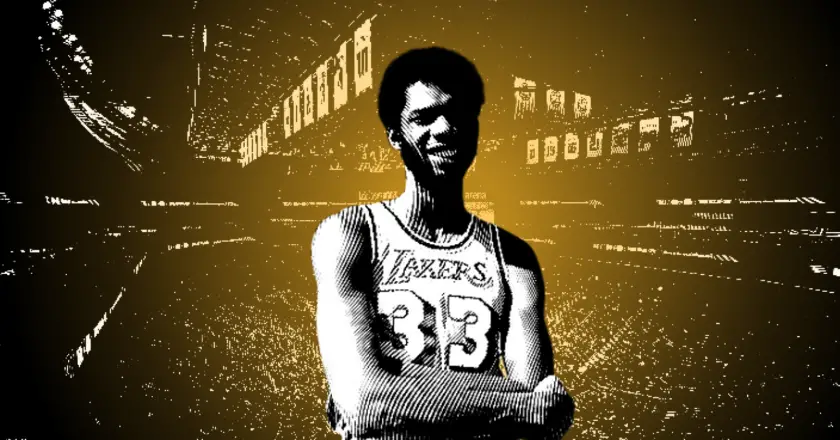Kareem Abdul-Jabbar, formerly known as Ferdinand Lewis Alcindor Jr., is an iconic figure in the world of basketball. His extraordinary skills, numerous accolades, and significant contributions to society have solidified his status as one of the greatest players in the history of the game.
Kareem Abdul-Jabbar was born on April 16, 1947, in New York City. Growing up in Harlem, he discovered his passion for basketball at an early age. Standing tall at 7 feet 2 inches, his height provided him with a natural advantage, and he quickly realized his potential on the court. Abdul-Jabbar’s early experiences, including his introduction to the game and the influences that shaped his basketball journey, are explored in detail, providing insights into the foundations of his love for the sport.
Abdul-Jabbar’s path to greatness continued at the University of California, Los Angeles (UCLA), where he played under the guidance of renowned coach John Wooden. His impact on the college basketball scene was immediate and transformative. During his three years at UCLA from 1966 to 1969, Abdul-Jabbar led the Bruins to an unprecedented three consecutive NCAA championships. His exceptional performance on the court, marked by his unmatched scoring ability, dominant rebounding, and defensive prowess, earned him three consecutive Player of the Year awards and established his reputation as an all-time college basketball great. This section explores the defining moments and significant achievements of his college career, highlighting the impact he had on the game and the admiration he garnered from fans and teammates alike.
Following his illustrious college career, Abdul-Jabbar declared for the NBA draft in 1969 and was selected as the first overall pick by the Milwaukee Bucks. His transition to the professional ranks was seamless, and he wasted no time making his mark in the NBA. In his rookie season, he averaged an astounding 28.8 points and 14.5 rebounds per game, leading him to win the Rookie of the Year award. This section explores his early years in the NBA, tracing his rapid rise to stardom and highlighting his individual achievements, including multiple All-Star selections and scoring titles.
Abdul-Jabbar’s offensive arsenal was anchored by his signature move, the skyhook. The skyhook, a virtually unblockable shot, became his trademark weapon and a testament to his unparalleled skill set. With flawless execution and unwavering precision, Abdul-Jabbar utilized the skyhook to dominate opponents and solidify his place as one of the most prolific scorers in NBA history. This section delves into the intricacies of the skyhook, showcasing its impact on his offensive game and examining how it contributed to his six NBA Most Valuable Player (MVP) awards and his place as the all-time leading scorer in NBA history.
Abdul-Jabbar’s career was marked by fierce rivalries with some of the greatest players of his era. From battling against Wilt Chamberlain, Bill Russell, and Willis Reed to facing off against Larry Bird and Magic Johnson, Abdul-Jabbar was a key protagonist in some of the most memorable matchups in basketball history. This section delves into these rivalries, exploring the intense competition, mutual respect, and the impact they had on the game. Additionally, the section highlights Abdul-Jabbar’s remarkable championship success, including two titles with the Milwaukee Bucks and five with the Los Angeles Lakers. The narrative also focuses on his numerous individual accolades, including six NBA MVP awards, 19 All-Star selections, and 11 All-NBA First Team honors.
Beyond his basketball achievements, Kareem Abdul-Jabbar utilized his platform to address social and political issues. In the late 1960s and early 1970s, he embraced Islam and changed his name, becoming an outspoken advocate for civil rights, racial equality, and religious tolerance. This section examines his cultural impact, highlighting his role as a trailblazer for athletes using their platform for social activism. It delves into his engagement with the civil rights movement, his advocacy for educational initiatives, and his efforts to promote equality and inclusivity in society. Additionally, the section explores his contributions to combating Islamophobia and fostering interfaith dialogue.
Following his retirement from professional basketball in 1989, Abdul-Jabbar embarked on a multifaceted post-playing career that showcased his diverse talents and passions. He delved into writing, authoring several books on a range of topics, including autobiographies, historical fiction, and children’s literature. This section explores his literary accomplishments and the impact of his writings, which have provided insightful perspectives on various subjects. Furthermore, it highlights Abdul-Jabbar’s philanthropic endeavors, focusing on his commitment to education, supporting underprivileged youth, and advocating for social change through his Skyhook Foundation.
Kareem Abdul-Jabbar’s enduring legacy extends far beyond his basketball accomplishments. His records, accolades, and social impact continue to inspire generations. This section reflects on his lasting influence, both on and off the court. It examines his impact on the game of basketball, his role as an ambassador for the sport, and his influence on subsequent generations of players. Additionally, it explores his legacy as a social justice advocate, emphasizing the importance of his activism and the trail he blazed for athletes to use their platform to effect positive change.
Kareem Abdul-Jabbar’s life and career epitomize excellence, resilience, and a commitment to social progress. From his exceptional college years to his unmatched success in the NBA, he has left an indelible mark on the world of basketball. Furthermore, his unwavering dedication to social justice and advocacy has solidified his position as an influential figure in society. Kareem Abdul-Jabbar’s legacy will forever be etched in the annals of sports history, inspiring generations to come and reminding us that true greatness encompasses not only athletic prowess but also the courage to fight for a more just and equitable world.

